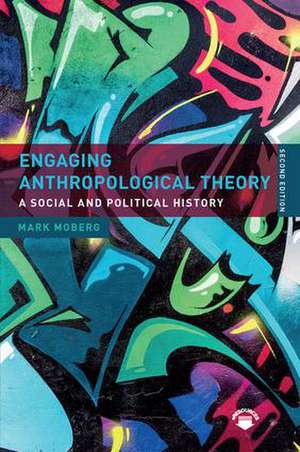Engaging Anthropological Theory: A Social and Political History
Autor Mark Mobergen Limba Engleză Paperback – 7 sep 2018
| Toate formatele și edițiile | Preț | Express |
|---|---|---|
| Paperback (2) | 373.72 lei 6-8 săpt. | +39.75 lei 7-13 zile |
| Taylor & Francis – 30 sep 2024 | 376.41 lei 3-5 săpt. | +39.75 lei 7-13 zile |
| Taylor & Francis – 7 sep 2018 | 373.72 lei 6-8 săpt. | |
| Hardback (2) | 774.04 lei 6-8 săpt. | |
| Taylor & Francis – 4 sep 2018 | 774.04 lei 6-8 săpt. | |
| Taylor & Francis – 30 sep 2024 | 775.06 lei 6-8 săpt. |
Preț: 373.72 lei
Nou
Puncte Express: 561
Preț estimativ în valută:
71.51€ • 74.86$ • 59.17£
71.51€ • 74.86$ • 59.17£
Carte tipărită la comandă
Livrare economică 05-19 aprilie
Preluare comenzi: 021 569.72.76
Specificații
ISBN-13: 9781138631342
ISBN-10: 1138631345
Pagini: 454
Ilustrații: 3 Tables, black and white; 77 Illustrations, black and white
Dimensiuni: 156 x 234 x 33 mm
Greutate: 0.86 kg
Ediția:Nouă
Editura: Taylor & Francis
Colecția Routledge
Locul publicării:Oxford, United Kingdom
ISBN-10: 1138631345
Pagini: 454
Ilustrații: 3 Tables, black and white; 77 Illustrations, black and white
Dimensiuni: 156 x 234 x 33 mm
Greutate: 0.86 kg
Ediția:Nouă
Editura: Taylor & Francis
Colecția Routledge
Locul publicării:Oxford, United Kingdom
Public țintă
Postgraduate and UndergraduateCuprins
1. Of Politics and Paradigms 2. Claims and Critiques of Anthropological Knowledge 3. Anthropology before Anthropologists 4. Theory and Practice to Change the World 5. Heirs to Order and Progress 6. Spencer, Darwin, and some Evolutionary Tales for our Time 7. The Boasian Revolution 8. Culture and Psychology 9. Functionalism, the Pure and the Hyphenated 10. Anti-Structure and the Collapse of Empire 11. Evolution Redux 12. Contemporary Materialist and Ecological Approaches 13. Symbols, Structures, and the “Web of Significance” 14. Postmodern Political Economy and Sensibilities 15. The Contemporary Anthropological Moment
Notă biografică
Mark Moberg is Professor of Anthropology at the University of South Alabama, USA, and has many years of experience teaching anthropological theory. His other books include Slipping Away: Banana Politics and Fair Trade in the Eastern Caribbean (2008).
Recenzii
Praise for the first edition:
"Moberg does a masterful job of weaving together historical context, anthropological theory, and present-day issues and sensibilities. Rather than standing at a critical distance and taking potshots at our disciplinary ancestors, Moberg shows students clearly how anthropology’s ideas and theoretical stances have arisen out of, and made sense within, their historical and geographical contexts. His style is engaging, readable, and often laugh-out-loud funny. How often can one say that about a theory textbook?"
–Julie Adkins, University of Texas at Arlington, USA
"While other textbooks on anthropological theory give token accounts of the socio-political influences and historical contexts that produced ‘ruling ideas’ on the nature of society and the origins of cultural diversity, these processes are the central focus of Moberg’s unique analysis. Moving beyond biographical sketches and historical vignettes, the book is a lively exploration of how ‘paradigms and politics’ of the past and present inform anthropological thought."
–William L. Alexander, University of North Carolina Wilmington, USA
"Moberg does a masterful job of weaving together historical context, anthropological theory, and present-day issues and sensibilities. Rather than standing at a critical distance and taking potshots at our disciplinary ancestors, Moberg shows students clearly how anthropology’s ideas and theoretical stances have arisen out of, and made sense within, their historical and geographical contexts. His style is engaging, readable, and often laugh-out-loud funny. How often can one say that about a theory textbook?"
–Julie Adkins, University of Texas at Arlington, USA
"While other textbooks on anthropological theory give token accounts of the socio-political influences and historical contexts that produced ‘ruling ideas’ on the nature of society and the origins of cultural diversity, these processes are the central focus of Moberg’s unique analysis. Moving beyond biographical sketches and historical vignettes, the book is a lively exploration of how ‘paradigms and politics’ of the past and present inform anthropological thought."
–William L. Alexander, University of North Carolina Wilmington, USA
Descriere
This fully revised second edition of Mark Moberg's lively book offers a fresh look at the history of anthropological theory. Covering key concepts and theorists, Engaging Anthropological Theory examines the historical context of anthropological ideas and the contested nature of anthropology itself. Anthropological ideas regarding human diversity have always been rooted in the socio-political conditions in which they arose and exploring them in context helps students understand how and why they evolved, and how theory relates to life and society. Illustrated throughout, this engaging text moves away from the dry recitation of past viewpoints in anthropology and brings the subject matter to life.
